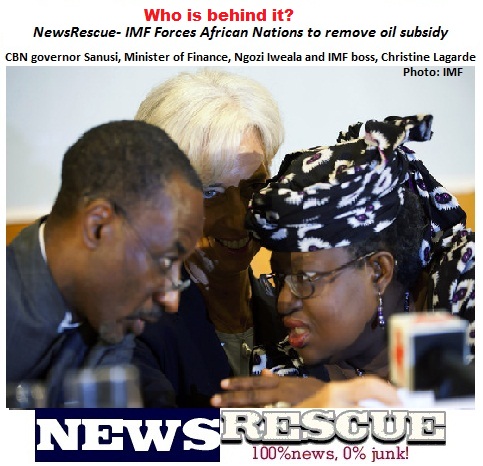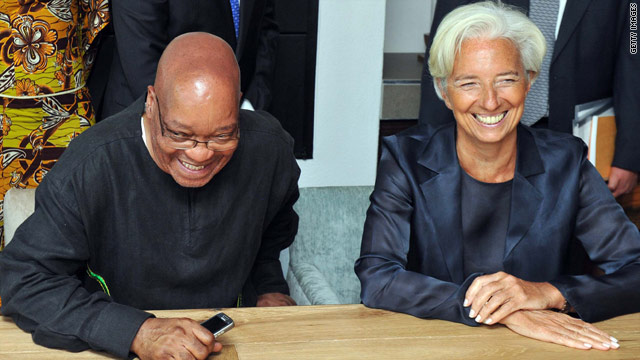South Africa snubs IMF’s Christine Lagarde!
NewsRescue- According to CNN, IMF (International Monetary Fund) boss, Christine Lagarde received a rather chilly welcome from the South African government, when she visited this January. The global recession and a lack of growth in the North (western nations), has resulted in debt-laden North now looking to the emerging market economies in the south for assistance. Portugal recently directly asked Angola for help. And the IMF has sojourned round Africa seeking to impose policies to bring about the same aid.
Emerging nations coerced to help ailing richer western economies
The article further said:
The reasons for the South Africans lukewarm response to her visit are now more clear. The headline of the Johannesburg-based Business Day newspaper reads, “IMF taps BRICS to fund $1 billion crisis gap.”The article said, “Emerging nations asked to help bail out ailing richer economies.”
It will be recalled from our article on January 1st, 2012 {IMF Forces African Nations to Remove Fuel Subsidies}, that Nigeria joined Guinea, Cameroon, Ghana and Chad, on New Years day to remove fuel subsidies in accordance with an order from the IMF, purportedly delivered by Christine Lagarde during her December visit to Nigeria. This created a jump in the price of automobile fuel from about 65 Naira per liter to 140Naira per liter overnight, Sunday. This brought fuel/gas prices in Nigeria to about the same price it is in the US, though lower than many European nations. The crushing economic crises has resulted in the famous “occupy” wall street riots in the US, that have resulted so far in 5,800 arrests and cases of police brutality; also the “Robin-hood” August riots of the UK. Greece is also hard hit and at the point of economic failure as are other western nations.
Related: NewsRescue-How The IMF-World Bank and Structural Adjustment Program(SAP) Destroyed Africa

Deadly crises invoked
There was resulting chaos, with strikes from the Nigerian Labor Unions and all businesses, markets, sea and air ports and other operations in Nigeria were halted for over a week January, in what resulted in a massive, paralyzing civilian revolution against the Government. Over 20 people died as a result of this rejection of the IMF guided, abrupt government unilateral decision.
The Nigerian Government on Monday, 16th January, again unilaterally acted to return normality by decreasing gas pump prices to 50% above pre-subsidy removal costs, and unleashing the army to prevent further peaceful gathering and protest.
Related: NewsRescue- World protests against IMF, World Bank and Nigeria subsidy removal
South Africa acts differently
It is apparent that South Africa, unlike Nigeria and the other West African Nations took another option: Reject IMF forceful European debt crises sharing unto African, better thriving and actually growing economies. The South Africans, who were also some of the only governments in Africa to stand by president Gaddafi against the NATO led invasion to the very end, snubbed the IMF leader on her visit.
CNN article further describes:
The South Africans, despite knowing about her visit for more than a month, had not scheduled any meetings with the Finance Minister, the Reserve Bank governor or any other key economic advisors. Crucially, no meeting was lined up with President Jacob Zuma.It seemed that IMF staff were scrambling to pin down the South Africans even after Lagarde had arrived in the country.In the end, Lagarde had ad hoc meetings in Pretoria with the country’s economic teams the morning after she arrived. It is unclear if they apologized, but I understand that one minister told her she visiting at a bad time; most South African government employees were still on their long Christmas holiday and the ruling ANC was holding it’s 100th birthday celebrations in Bloemfontein, a four-hour drive away from Pretoria.The arrival of one of the world’s most powerful women in southern Africa was clearly not a priority, it seemed.At one stage it was suggested she would meet South African president Jacob Zuma the following Wednesday – five days away – and the only time he would be able to fit her into his schedule.From what I understand, it was becomingly increasingly clear to the IMF folks that Zuma was not going to make the effort to meet Lagarde. She would have to go to him.When we sat down for a wide-ranging interview in a Pretoria hotel, I asked Lagarde if she had managed to pin down Zuma yet? Lagarde smiled wryly to me and said she would be flying to Bloemfontein to meet Zuma the following day.Deeply tanned and beautifully groomed in that indomitable French way, Lagarde appeared pragmatic, gracious and seemingly unfazed by this apparent snub.

CNN further described Lagarde as apparently arriving with a ‘begging-bowl’.
South Africa is the newest, most controversial member of BRICS, a club of new financial powerhouses originally made up of Brazil, Russia, India and China. South Africa’s economy is a minnow compared to their BRIC brothers but the country is Africa’s largest economy and seen as a gateway into the continent’s lucrative and growing markets.
It is left to our imagination why Nigeria and other West African nations did not put the urgent development and progress of their nations ahead of Northern nations, but went head to implement pro-west survival, crushing financial policies on their citizenry.


No comments:
Post a Comment